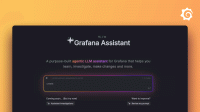Important: This documentation is about an older version. It's relevant only to the release noted, many of the features and functions have been updated or replaced. Please view the current version.
remote.kubernetes.configmap
remote.kubernetes.configmap reads a ConfigMap from the Kubernetes API server and exposes its data for other components to consume.
This can be useful anytime Alloy needs data from a ConfigMap that is not directly mounted to the Alloy pod.
Usage
remote.kubernetes.configmap "LABEL" {
namespace = "NAMESPACE_OF_CONFIGMAP"
name = "NAME_OF_CONFIGMAP"
}Arguments
The following arguments are supported:
When this component performs a poll operation, it requests the ConfigMap data from the Kubernetes API. A poll is triggered by the following:
- When the component first loads.
- Every time the component’s arguments get re-evaluated.
- At the frequency specified by the
poll_frequencyargument.
Any error while polling will mark the component as unhealthy. After a successful poll, all data is exported with the same field names as the source ConfigMap.
Blocks
The following blocks are supported inside the definition of remote.kubernetes.configmap:
The > symbol indicates deeper levels of nesting.
For example, client > basic_auth refers to a basic_auth block defined inside a client block.
client block
The client block configures the Kubernetes client used to discover Probes.
If the client block isn’t provided, the default in-cluster configuration with the service account of the running Alloy pod is used.
The following arguments are supported:
At most, one of the following can be provided:
no_proxy can contain IPs, CIDR notations, and domain names. IP and domain names can contain port numbers.
proxy_url must be configured if no_proxy is configured.
proxy_from_environment uses the environment variables HTTP_PROXY, HTTPS_PROXY and NO_PROXY (or the lowercase versions thereof).
Requests use the proxy from the environment variable matching their scheme, unless excluded by NO_PROXY.
proxy_url and no_proxy must not be configured if proxy_from_environment is configured.
proxy_connect_header should only be configured if proxy_url or proxy_from_environment are configured.
basic_auth block
password and password_file are mutually exclusive, and only one can be provided inside a basic_auth block.
authorization block
credential and credentials_file are mutually exclusive, and only one can be provided inside an authorization block.
oauth2 block
client_secret and client_secret_file are mutually exclusive, and only one can be provided inside an oauth2 block.
The oauth2 block may also contain a separate tls_config sub-block.
no_proxy can contain IPs, CIDR notations, and domain names. IP and domain names can contain port numbers.
proxy_url must be configured if no_proxy is configured.
proxy_from_environment uses the environment variables HTTP_PROXY, HTTPS_PROXY and NO_PROXY (or the lowercase versions thereof).
Requests use the proxy from the environment variable matching their scheme, unless excluded by NO_PROXY.
proxy_url and no_proxy must not be configured if proxy_from_environment is configured.
proxy_connect_header should only be configured if proxy_url or proxy_from_environment are configured.
tls_config block
The following pairs of arguments are mutually exclusive and can’t both be set simultaneously:
ca_pemandca_filecert_pemandcert_filekey_pemandkey_file
When configuring client authentication, both the client certificate (using
cert_pem or cert_file) and the client key (using key_pem or key_file)
must be provided.
When min_version is not provided, the minimum acceptable TLS version is
inherited from Go’s default minimum version, TLS 1.2. If min_version is
provided, it must be set to one of the following strings:
"TLS10"(TLS 1.0)"TLS11"(TLS 1.1)"TLS12"(TLS 1.2)"TLS13"(TLS 1.3)
Exported fields
The following fields are exported and can be referenced by other components:
The data field contains a mapping from field names to values.
Component health
Instances of remote.kubernetes.configmap report as healthy if the most recent attempt to poll the kubernetes API succeeds.
Debug information
remote.kubernetes.configmap does not expose any component-specific debug information.
Debug metrics
remote.kubernetes.configmap does not expose any component-specific debug metrics.
Example
This example reads a Secret and a ConfigMap from Kubernetes and uses them to supply remote-write credentials.
remote.kubernetes.secret "credentials" {
namespace = "monitoring"
name = "metrics-secret"
}
remote.kubernetes.configmap "endpoint" {
namespace = "monitoring"
name = "metrics-endpoint"
}
prometheus.remote_write "default" {
endpoint {
url = remote.kubernetes.configmap.endpoint.data["url"]
basic_auth {
username = remote.kubernetes.configmap.endpoint.data["username"]
password = remote.kubernetes.secret.credentials.data["password"]
}
}
}This example assumes that the Secret and ConfigMap have already been created, and that the appropriate field names exist in their data.


